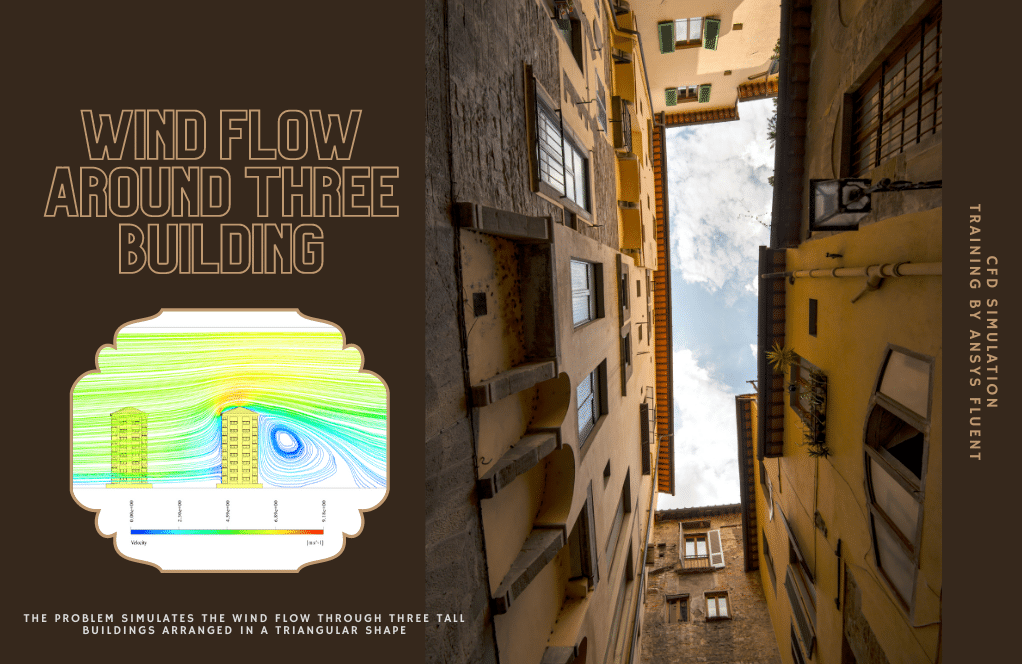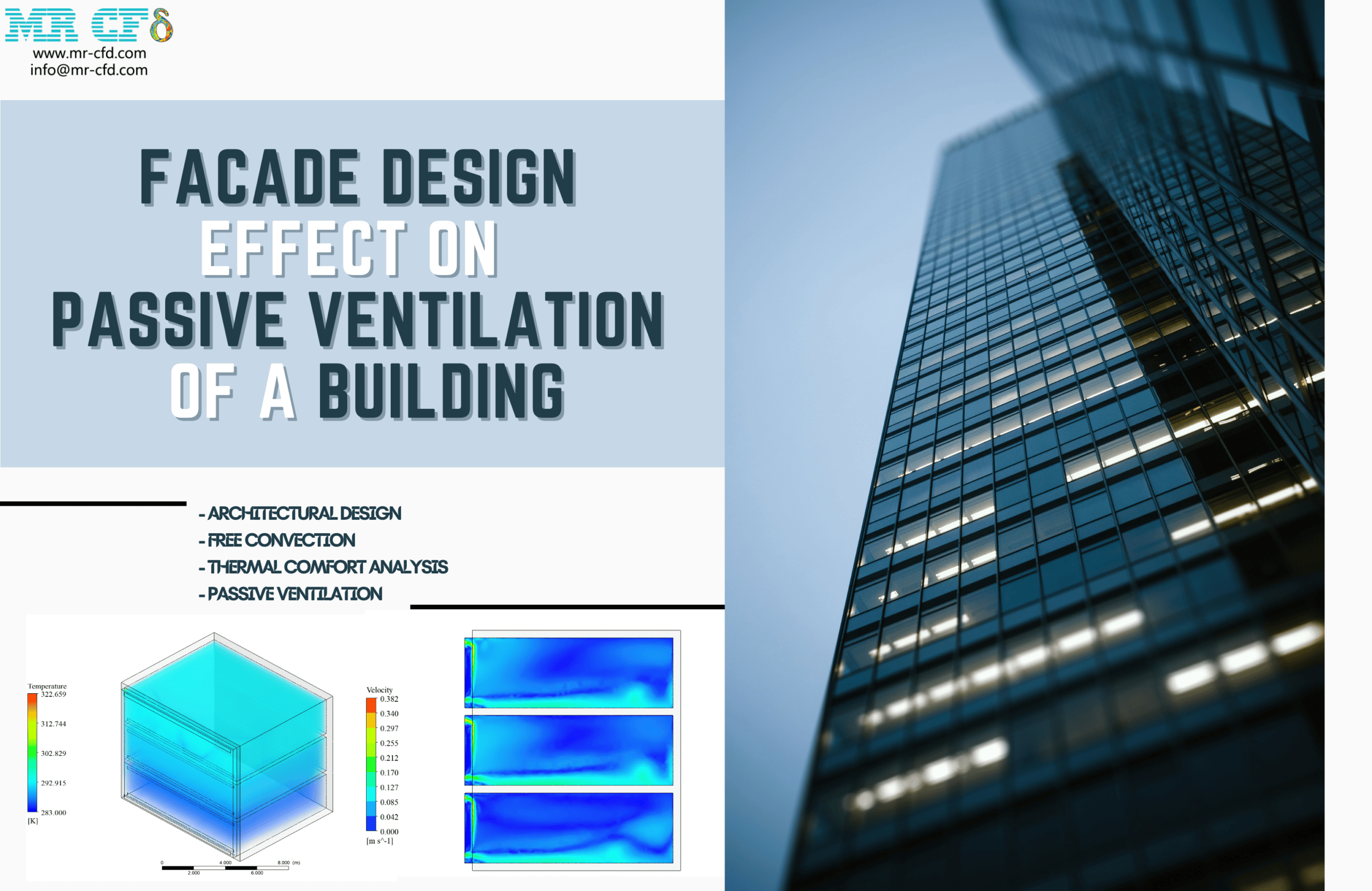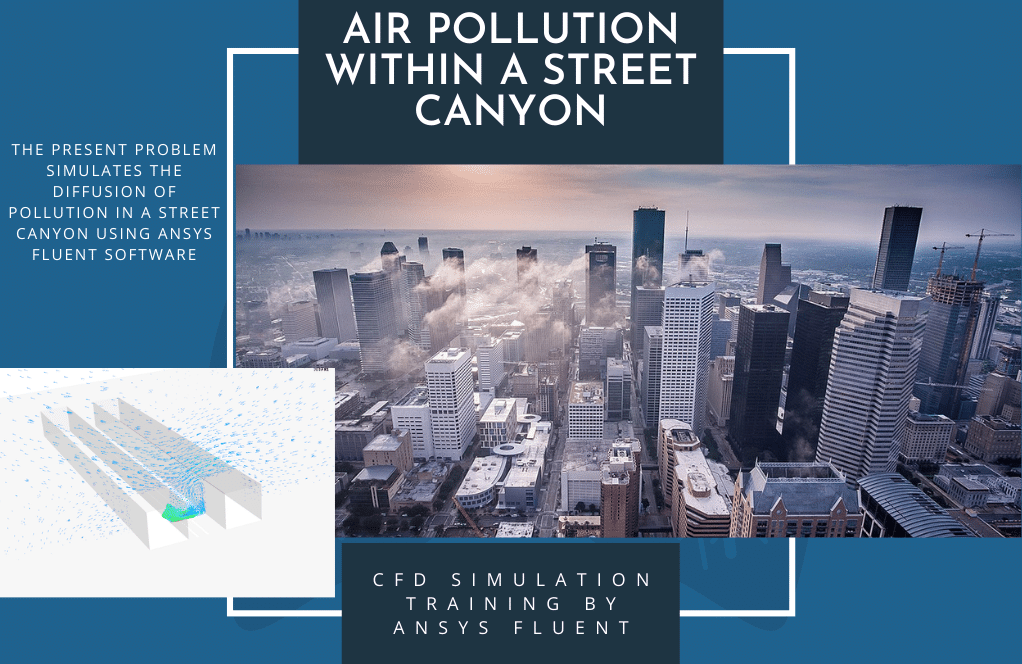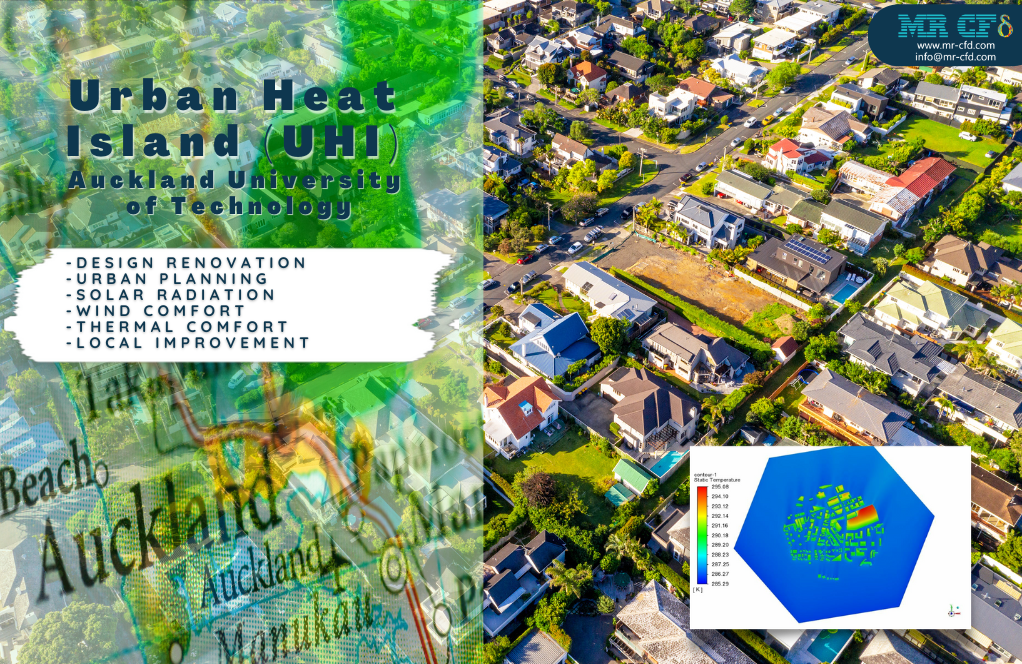Wind Flow Around Three Buildings CFD Simulation, ANSYS Fluent Tutorial
Free
- The problem numerically simulates the Wind Flow Around Three Buildings using ANSYS Fluent software.
- We design the 3-D model by the Design Modeler software.
- We mesh the model with ANSYS Meshing software, and the element number equals 6392910.
To Order Your Project or benefit from a CFD consultation, contact our experts via email (info@mr-cfd.com), online support tab, or WhatsApp at +44 7443 197273.
There are some Free Products to check our service quality.
If you want the training video in another language instead of English, ask it via info@mr-cfd.com after you buy the product.
Description
Description
The problem simulates the airflow through three buildings which are arranged in a triangular shape by ANSYS Fluent software. In fact, these buildings are considered barriers.
In the present case, the area around the three buildings is considered, where the wind enters it horizontally at a velocity of 5 m/s and collides with the buildings.
The purpose of this project is to investigate the behavior of wind flow around buildings after dealing with them and to study the behavior of air in the space between the buildings.
Buildings Methodology
The present 3-D modeling is carried out using the Design Modeler software. The meshing of the model has been done using ANSYS Meshing software and the mesh type is unstructured. The element number is 6392910 and the cells adjacent to the structures are much smaller and more accurate.
Buildings Conclusion
After the solution process is complete, we obtain contours of velocity and pressure, and also velocity vectors and two-dimensional pathlines.
Speed contours and flow lines show that the wind flow has reached its maximum value when it hits the tip of the building, and then a separation vortex is formed behind the building.
The separation vortex formed behind the middle building, unlike the other two buildings, is symmetrical. In fact, the two vortices are interconnected, and the resulting vortex is larger than the separation vortex formed behind the other two buildings.
The pressure contour also shows well that the most pressure occurs in front of the middle building.










Frieda Breitenberg –
I’m interested in simulating wind flow around a cluster of high-rise buildings. Do you think this simulation can handle that?
MR CFD Support –
Definitely, this simulation is designed to handle complex geometries, including clusters of high-rise buildings. It can accurately simulate the complex wind flow patterns that occur in such scenarios
Mr. Lincoln Fay I –
Can this simulation be used to evaluate the impact of wind on building energy consumption?
MR CFD Support –
Yes, the simulation can be used to evaluate the impact of wind on building energy consumption. By accurately simulating wind flow around buildings, it can help identify areas of potential energy loss due to wind.
Dr. Julie Ward V –
How does the simulation handle wind direction? Can it simulate wind coming from different directions?
MR CFD Support –
Absolutely, the simulation is flexible and can be adjusted to simulate wind coming from any direction. This is crucial for accurately predicting how wind will interact with buildings in real-world conditions.
Manuel Bartell –
I noticed that this simulation uses the k-epsilon turbulence model. Why was this model chosen over other turbulence models?
MR CFD Support –
The k-epsilon model is a popular choice in the CFD community, especially for simulations involving complex geometries like buildings. It offers a good balance between accuracy and computational efficiency. However, we can certainly use a different turbulence model if your project requires it.
Garrett White –
I took this because studying my field of work was very interesting, and I am working in this field now.
Charlie Ullrich –
I was impressed with how detailed the results were. It was fascinating to see how the airflow changed and how vortices developed behind the buildings. This kind of simulation could be incredibly beneficial for urban planning and for architects looking to design more wind-resistant or energy-efficient buildings!
MR CFD Support –
Thank you for acknowledging the detail and complexity of our simulation results. We are thrilled that you found the data on airflow behaviors and vortices both fascinating and practical. Your insight into its potential applications in urban planning and architecture is particularly appreciated. We strive to provide useful tools for professionals in various fields, and it’s rewarding to hear that our products can indeed offer valuable contributions.
Reanna Grady –
MR-CFD has a very good expression.
Geo Klocko Jr. –
I absolutely loved the thoroughness of the CFD simulation showcasing the wind flow around the buildings! I found the details provided on air behavior between the buildings after collision particularly enlightening and the visualization using pressure and velocity contours was excellent.
MR CFD Support –
Thank you for your positive feedback! We’re delighted to hear that our CFD simulation of wind flow around buildings met your expectations and provided clear and informative visualizations. It’s great to know our efforts to deliver comprehensive analyses resonate well with our users.
Hettie Rath Sr. –
The tutorial for the Wind Flow Around Three Buildings using ANSYS Fluent was absolutely insightful! The details on the flow pattern, especially the separation vortex behind the middle building, were particularly fascinating. It was intriguing to see how the symmetrical arrangement affects the airflow.
MR CFD Support –
Thank you very much for your kind words! We’re delighted to hear that you found our ANSYS Fluent tutorial on wind flow around buildings insightful and intriguing. Understanding the flow patterns and separation vortex is crucial for architectural aerodynamics, and we’re glad this tutorial was able to convey those concepts effectively. Your feedback inspires us to continue creating high-quality CFD learning materials. If you have any more questions or need further assistance with simulations, don’t hesitate to reach out.
Miss Veronica Zieme –
The tutorial was super helpful to visualize airflow in realistic urban settings. The introduction of a triangulated building placement created complex flow patterns that were fascinating to see! The clarity of the vortices formed and how they interacted with one another really added depth to my understanding of wind flow in urban environments.
MR CFD Support –
Thank you for your positive feedback! We’re delighted to hear that our Wind Flow Around Three Buildings CFD Simulation tutorial provided you with valuable insights and enhanced your understanding of aerodynamic effects in urban settings. Your appreciation truly motivates us to continue creating high-quality educational content. Should you have any further questions or need assistance with your simulations, feel free to reach out.
Bruce Hodkiewicz –
The tutorial really lays out the airflow dynamics clearly, and the visualizations are incredibly helpful for understanding wind flow patterns around structures. Well done!
MR CFD Support –
Thank you for your positive feedback! We’re delighted to hear that the tutorial and visualizations met your expectations and provided you with a clear understanding of the aerodynamics involved. If you have any further questions or need more assistance with wind flow simulations, feel free to reach out.
Bennett Welch –
I was amazed by how the separation vortex behind the middle building was different from the others due to its symmetrical nature. The visualization of the velocity and pressure contours truly helped me understand the complex aerodynamics involved in urban landscapes. Great product!
MR CFD Support –
Thank you for taking the time to leave such a positive review! We’re thrilled to hear that our simulation provided you with clear insights into the wind flow dynamics around buildings. Understanding the aerodynamics in urban settings can indeed be complex, and we are glad that our product could make it more accessible for you. If you have further feedback or need any additional information, please don’t hesitate to reach out.
Mr. Liam Armstrong –
This tutorial sounds thorough. The visual outputs provided must have been very helpful in understanding wind dynamics among urban structures. Thank you!
MR CFD Support –
Thank you for your positive feedback! We’re delighted to hear that our simulation and its results were helpful in enhancing your understanding of wind flow around buildings. If you have any further questions or need assistance with other simulations, feel free to reach out!
Dr. Ashley Windler PhD –
The detail on the wind’s interaction with the buildings was very useful for my project. The symmetry of the vortex behind the middle building was particularly interesting. Great simulation!
MR CFD Support –
We’re delighted to hear that the simulation was beneficial for your project and that you found the aspect of the wind’s interaction with the buildings to be insightful. Thank you for taking the time to share your positive experience. Should you need any further information or assistance, please don’t hesitate to reach out to us.
Prof. Giuseppe Terry I –
The tutorial was fantastic! It really helped me understand how the wind flow behaves around structures and the impact buildings have on altering airflow patterns. The visuals were especially insightful, showing the velocity and pressure changes. Just a quick question – will we be able to apply similar simulation techniques to more irregularly shaped buildings, or is this specific to the design used in the tutorial?
MR CFD Support –
I’m delighted to hear that you enjoyed the tutorial and found it helpful. To answer your question, the simulation techniques shown can certainly be adjusted and applied to buildings with more irregular shapes. While this tutorial focused on a particular setup, the principles can be adapted. It’s all about setting up the appropriate mesh, boundary conditions, and solving methods to tackle different building geometries in your airflow analysis within ANSYS Fluent.
Dr. Annalise Towne –
The description of the vortex formation was fascinating. I’ve always been curious about wind patterns around urban structures, and this simulation gave me an insight I didn’t know I needed!
MR CFD Support –
Thank you for your feedback! We’re thrilled to hear that the simulation provided you with valuable insights into urban wind patterns. Our goal is always to deliver informative and accessible simulations that enhance understanding in fluid dynamics. If you have any more questions, feel free to ask!
Macy Hamill –
The level of detail in the simulation of wind flow around the three buildings is superb. Investigating the wind behavior and flow separation caused by these structures provides useful insights for urban planning and architecture. The study of vortices between buildings is especially critical for assessing pedestrian comfort and structural wind loading. Great job on capturing the flow dynamics with precision.
MR CFD Support –
Thank you for your positive review. We’re glad that you found the simulation helpful and insightful. It’s encouraging to hear when our efforts in providing detailed CFD analyses have practical applications and contribute to the fields of urban planning and architecture. We appreciate you taking the time to acknowledge the precision of our work!
Dr. Virginie Lebsack DVM –
I found the study fascinating, especially how the simulation shows the separation vortex behavior. Is the impact of these findings prioritized for any specific application, such as urban planning or building design?
MR CFD Support –
The simulation’s findings certainly have applications in urban planning and building design for creating efficient wind-flow patterns and managing microclimates within urban areas, as well as addressing potential wind load on structures. If utilized correctly, such research can lead to more comfortable and safer living spaces within densely built environments.
Miss Tia Kerluke I –
The detailed wind flow insights are fascinating! Thanks to the high-quality simulation, it was possible to visualize complex aerodynamic interactions around urban structures. Great learning tool for understanding urban wind flow dynamics!
MR CFD Support –
Thank you very much for your positive feedback! We are thrilled to hear that our software provided valuable insights and helped you better understand urban wind flow. If you have any more questions or need further assistance, please don’t hesitate to reach out.
Miss Cassie Nolan –
I’ve learned so much from your tutorial! The details on wind interaction with building structures were fascinating and well-presented. I’m truly impressed with the way the complex airflow behavior was described through the simulations. Keep up the excellent work!
MR CFD Support –
Thank you for your kind words! We’re delighted to hear you found the tutorial on wind flow around buildings helpful and informative. Our aim is to provide clear and comprehensive simulations to aid in understanding complex fluid dynamics. If there’s any other topic you’re interested in or if you have further questions, don’t hesitate to let us know. We appreciate your feedback!
Riley Welch –
The detailed explanation and results analysis provided in this product really helped me understand the wind behavior around the buildings. Visualizing the separation vortex was insightful, and the beauty of these simulations is how they provide immediate visual feedback. Great work on setting up such a realistic scenario and offering deep insights through the velocity and pressure contours!
MR CFD Support –
Thank you for your positive feedback! We’re glad to hear that our product has been helpful in enhancing your understanding of wind behavior around buildings, and that you found the visualizations insightful. Our aim is always to provide valuable and realistic simulations that offer clear and useful analysis. Your appreciation is much appreciated, and we look forward to continuing to provide high-quality learning tools in the future.
Mr. Sidney Nicolas –
This tutorial has been invaluable for visualizing wind impact on urban structures. The velocity contours and separation vortices patterns were especially enlightening!
MR CFD Support –
Thank you for the positive feedback! We’re thrilled to hear that our tutorial on Wind Flow Around Three Buildings was helpful in understanding aerodynamics in an urban context.
Florence Predovic –
Magnificent tutorial! It provided clear insights into the complex airflow patterns around the buildings, helping me understand the concept of separation vortexes. Well-structured and with a high level of detail, this has improved my CFD skills beyond expectations!
MR CFD Support –
Thank you for your enthusiastic review! We’re thrilled to hear that our tutorial on wind flow around three buildings using ANSYS Fluent was able to significantly enhance your CFD skills. Understanding complex airflow patterns is crucial, and we’re glad that our material was presented in a way that made it accessible. Stay tuned for more high-quality tutorials!
Vada Ferry –
I’m amazed by the level of detail in the wind flow simulation around the buildings. Could you explain how this study might benefit urban planning and architectural design?
MR CFD Support –
Thank you for your positive feedback on the wind flow simulation around buildings. This study can significantly inform urban planning and architectural design by providing insights into how wind behaves as it encounters structures. It allows planners and architects to consider wind comfort for pedestrians, possibilities for ventilation, the impact of wind on structural loading, and potential energy savings through natural cooling. The findings can enhance building placement and design for improved safety, comfort, and energy efficiency.